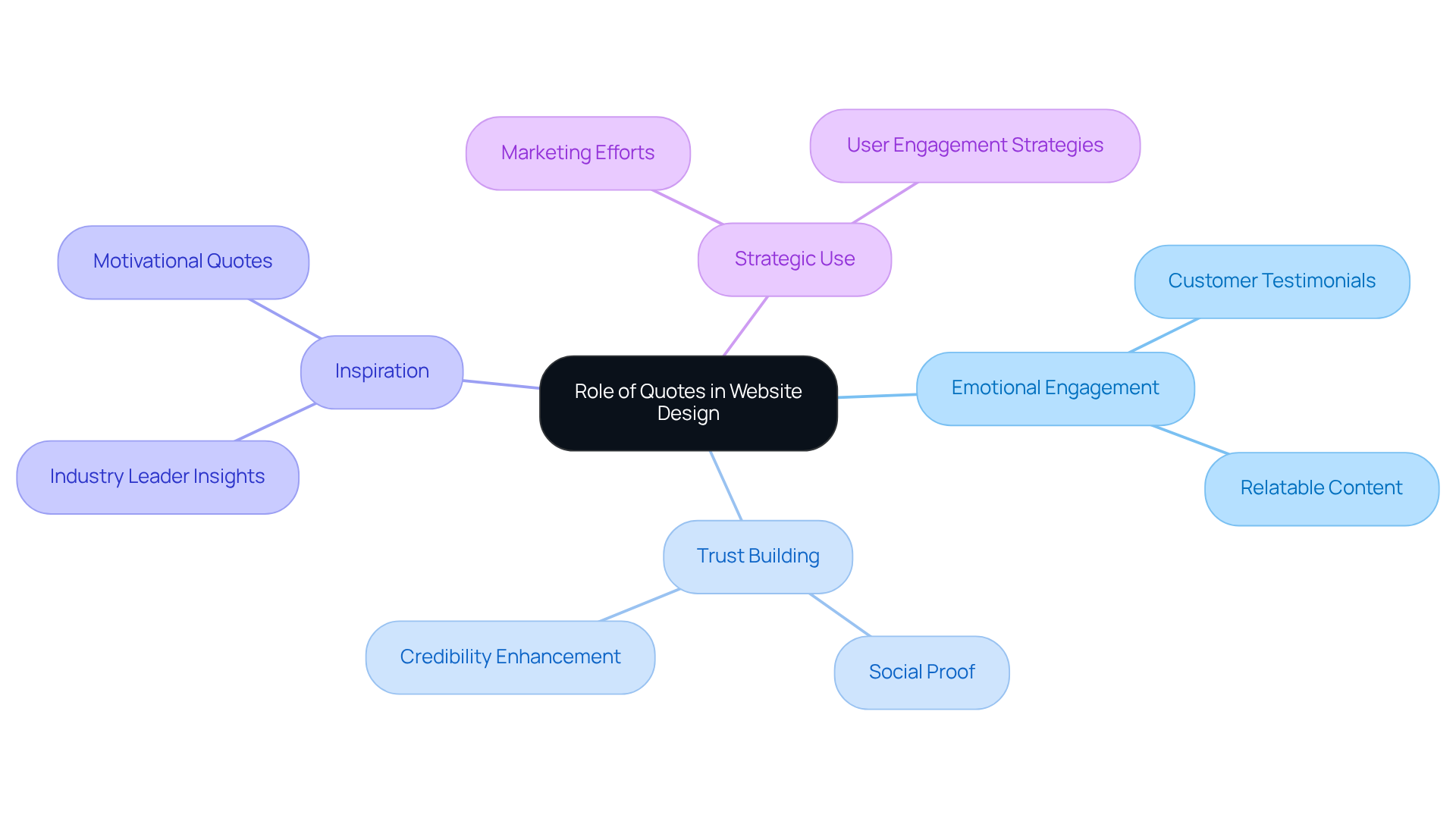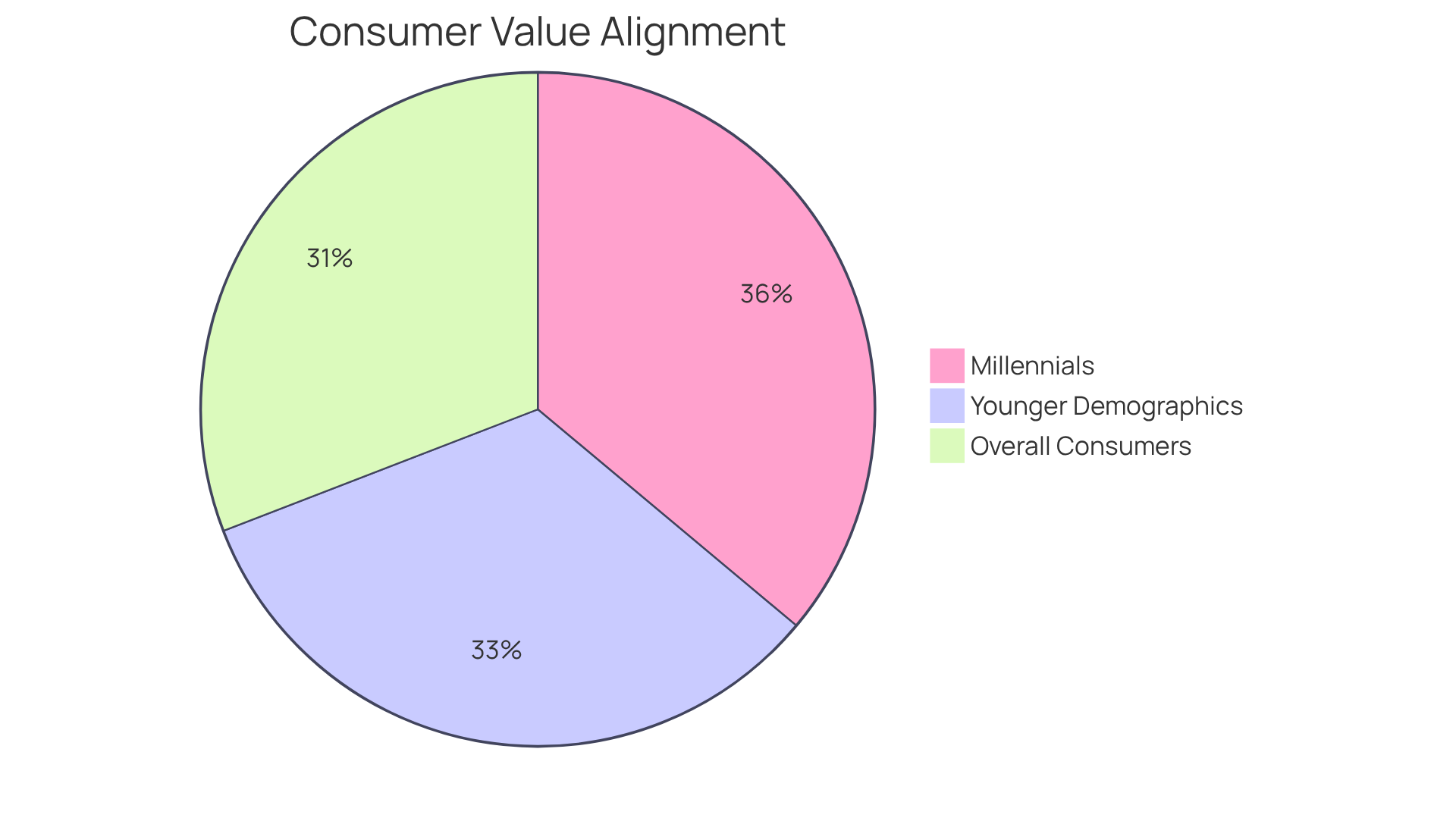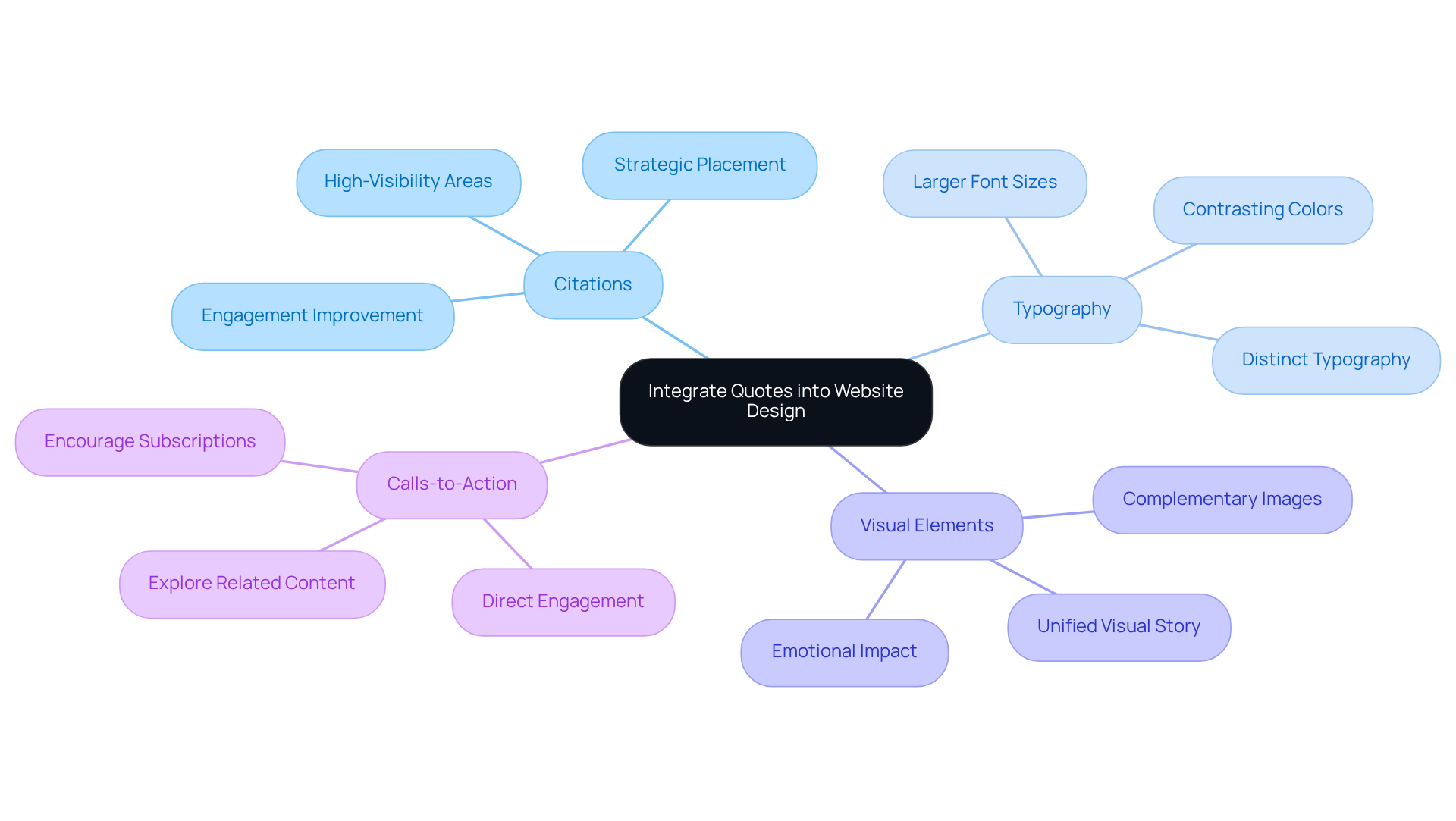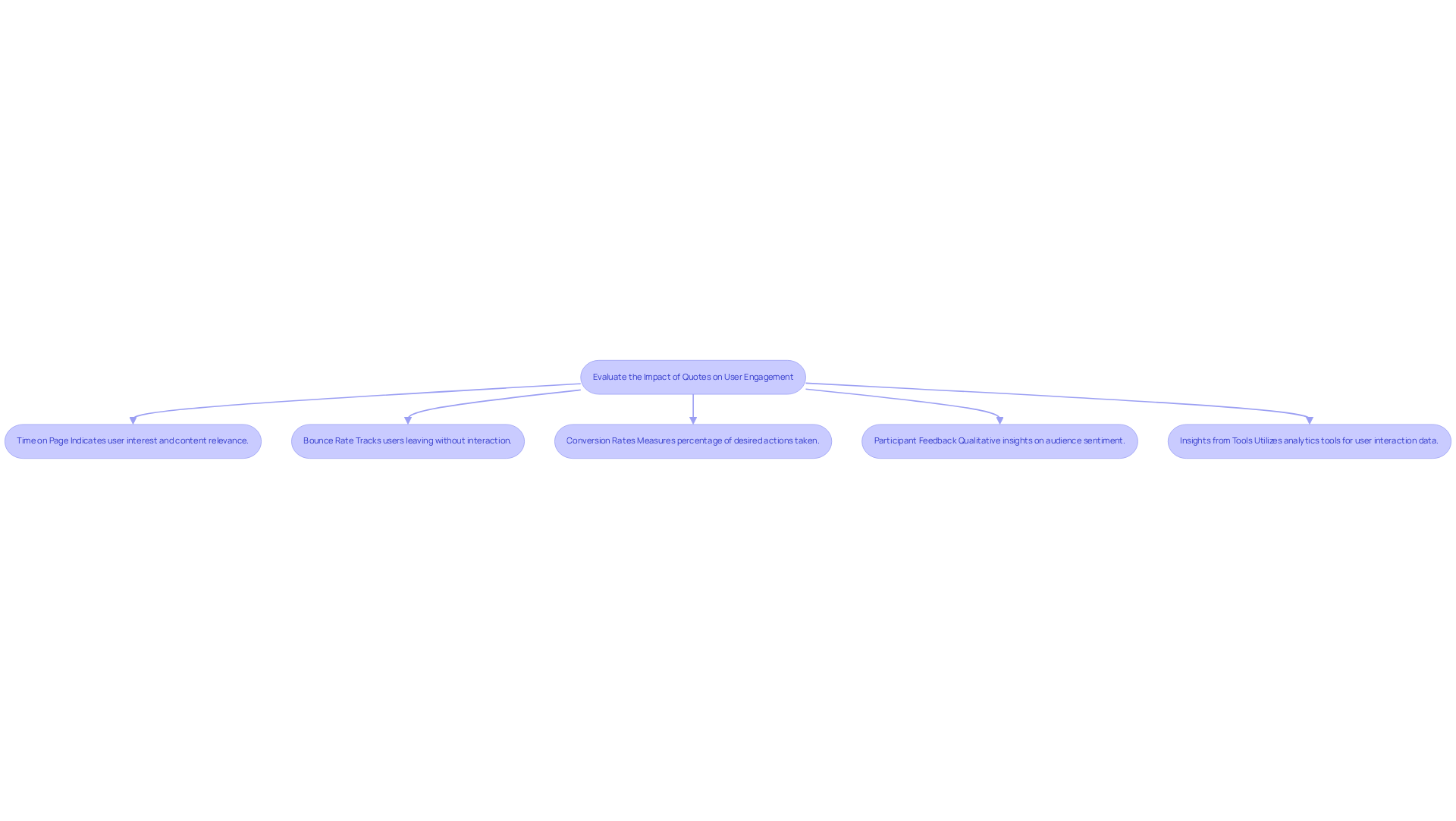Overview
The article highlights a common challenge faced by many in website design: how to truly engage users. This lack of engagement can lead to feelings of distrust and disconnection, which may hinder the growth of your brand. By recognizing this issue, we can better understand the emotional needs of users and the importance of fostering trust and credibility.
One effective way to address this challenge is through the strategic integration of quotes. These quotes can serve as emotional touchpoints, resonating with your brand values and creating a sense of connection. Imagine a potential customer landing on your site and being greeted by a powerful quote that reflects your mission. This simple yet profound approach can significantly enhance user interaction and boost conversion rates.
Statistics show that incorporating relevant quotes can lead to a positive impact on user engagement. When users feel emotionally connected, they are more likely to trust your brand and take action. This is where RNO1 can step in, offering expertise in crafting a website that not only looks appealing but also resonates on a deeper level.
As we explore the power of quotes, consider how they can transform your website into a nurturing space that invites users to share their experiences. By creating a community around your brand, you can foster a sense of belonging and support, ultimately leading to stronger relationships with your audience.
In conclusion, integrating quotes into your website design is not just a strategy; it’s a way to connect with users on an emotional level. Let RNO1 help you create a website that embodies these values, ensuring that your audience feels valued and understood.
Introduction
In the competitive landscape of website design, capturing user attention is paramount. Yet, many designers grapple with the challenge of creating authentic engagement, which can often feel overwhelming. This struggle is not just about aesthetics; it touches on the very heart of user experience and connection.
How do we transform standard webpages into emotionally resonant experiences that foster trust? Leveraging impactful quotes can serve as a powerful tool in this endeavor. However, the challenge lies in selecting the right quotes and integrating them effectively.
It’s essential for designers to ensure that these elements enhance user experience while aligning with their brand's core values. By thoughtfully incorporating meaningful quotes, designers can create a nurturing atmosphere that resonates deeply with users, inviting them into a more engaging and trustworthy digital experience.
Understand the Role of Quotes in Website Design
In the realm of , a significant challenge often arises: how to truly engage users and foster trust. This is where emerge as invaluable resources, serving as emotional touchpoints that can strengthen messaging and enhance engagement. When thoughtfully integrated, they highlight , share insights from industry leaders, and succinctly encapsulate a .
Consider a testimonial from a satisfied client; it not only fosters trust but also builds credibility. Similarly, a thought-provoking remark from a renowned figure can inspire individuals to delve deeper into the content. As Frank Chimero wisely noted, "People ignore designs that ignore people," underscoring the importance of relatable content.
By carefully weaving in these quotes about website design, designers can create a more engaging experience, nurturing a stronger bond between the company and its audience. Moreover, statistics reveal that are more likely to become paying clients, further highlighting the importance of utilizing testimonials to enhance on your website. Together, these elements form a that not only addresses the emotional needs of users but also aligns with the professional aspirations of tech startup founders.

Select Relevant Quotes That Align with Your Brand
Choosing phrases that resonate with your identity begins with recognizing your fundamental values and messaging. It's important to consider the emotions you wish to evoke in your audience. For instance, if your brand emphasizes innovation, seek statements that reflect creativity and forward-thinking. Resources like books, interviews, and reputable websites can help you find quotes about website statements that truly resonate. Additionally, think about the context in which the citation will be used; it should feel natural and relevant to the surrounding content. For example, a saying about teamwork can beautifully complement a page discussing your company's .
Prioritizing authenticity and relatability in your quote selection is crucial. Quotes should not only reflect your but also resonate with your target audience's beliefs. This alignment is vital, especially since:
- 83% of Millennials prioritize ,
- 71% of consumers prefer purchasing from these companies,
- 76% of 18-34-year-olds appreciate when CEOs speak out on issues they care about.
These statistics highlight the that . By incorporating statements that reflect your , you can enhance and cultivate a stronger bond with your followers.

Integrate Quotes into Your Website Design Strategically
Incorporating citations into your website layout can significantly enhance visitor interaction when approached with care. Many founders face the challenge of engaging their audience effectively. This struggle can lead to missed opportunities for connection and conversion. However, by thoughtfully integrating citations, you can create a more inviting experience for your visitors.
Consider the placement of your citations. Position them in high-visibility areas, like the homepage or landing pages, where they can capture immediate attention. This strategic placement can lead to improved . Did you know that ? This highlights how influential statements can guide their choices and foster trust.
Typography also plays a crucial role in how your citations are perceived. Using distinct typography can help make these sayings stand out. Larger font sizes or contrasting colors can differentiate citations from standard text, ensuring they are easily noticed. As Alec Hanak, Head of Design, notes, "Driven by strategy and logic, I take pride in crafting unparalleled pixel-perfect designs." This quote underscores the importance of typography in .
Visual elements can further enhance the . By incorporating complementary images or backgrounds, you create a unified visual story that resonates with viewers. For instance, pairing a serene landscape with a saying about peace can evoke powerful emotions. Captivating visuals can increase the time individuals spend on your site, with .
Additionally, consider combining citations with (CTAs). This approach directs individuals toward deeper engagement, whether that means exploring related content or subscribing to newsletters. By encouraging interaction, you can help convert visitors into leads. In fact, .
By thoughtfully incorporating quotes about into your website, you can create a more immersive and captivating experience that resonates with visitors, encouraging them to explore further. Remember, every small detail counts in nurturing a connection with your audience.

Evaluate the Impact of Quotes on User Engagement
When it comes to engaging your audience, the influence of can be significant. Have you ever noticed how certain pages capture attention more effectively than others? By utilizing analytics tools, you can and truly understand this dynamic. Let’s explore some key metrics that can illuminate the impact of citations on .
First, consider . It’s essential to monitor whether individuals spend more time on pages that include citations compared to those that don’t. A greater average duration on the page can indicate that citations spark interest and encourage deeper exploration. On average, across various industries, visitors typically spend between 52 and 54 seconds on a page. This benchmark can guide you in evaluating engagement levels.
Next, let’s look at . Investigating whether the addition of citations correlates with lower bounce rates can reveal if visitors are more likely to stay and interact with your content. It’s noteworthy that 38% of individuals might abandon a website if it lacks , highlighting how citations can enhance visual charm and improve visitor retention.
Then, there are . Examining whether pages featuring citations yield higher conversion rates—like increased sign-ups or purchases—can show their effectiveness in encouraging desired actions.
Don’t overlook Participant Feedback. Collecting qualitative insights through questionnaires or participant testing can help assess how well citations resonate with your audience. Understanding audience sentiment is invaluable and can guide your future content strategies.
Additionally, consider leveraging tools like Contentsquare, which provide insights into interactions, to monitor how effectively citations enhance audience involvement. By consistently tracking these metrics, you can refine your approach to integrating citations, ensuring they truly and contribute positively to your overall , as stated in several quotes about website effectiveness. Remember, your goal is not just to inform but to create a connection with your audience, nurturing their interest and encouraging them to explore further.

Conclusion
Incorporating quotes into website design presents a significant challenge for many brands: how to enhance user engagement and foster trust. This issue resonates deeply, as a lack of emotional connection can lead to missed opportunities for interaction and conversion. By strategically selecting and integrating relevant quotes, designers can bridge this gap, creating emotional ties that resonate with their audience. This thoughtful approach not only reflects a brand's values but also aligns with the beliefs of its target audience, making it an essential component of effective web design.
Key insights from the article highlight the multifaceted role quotes can play in website engagement. Authentic quotes that align with brand messaging are crucial, as is their strategic placement and visual enhancement. Each of these elements contributes to a more engaging user experience, addressing the pain points that arise when users feel disconnected. Metrics such as time on page, bounce rates, and conversion rates serve as valuable tools for evaluating the effectiveness of quotes in capturing attention and encouraging deeper exploration.
Ultimately, integrating quotes into website design transcends mere aesthetics; it is about fostering a meaningful dialogue with users. By prioritizing the emotional and relational aspects of design, brands can cultivate stronger connections with their audience. Embracing the power of quotes can transform a website from a simple information hub into an engaging platform that inspires action and loyalty. Together, let’s explore how we can create spaces that not only inform but also inspire, inviting users to engage in a shared journey.
Frequently Asked Questions
Why are quotes important in website design?
Quotes are important in website design because they serve as emotional touchpoints that can strengthen messaging, enhance engagement, and foster trust with users.
How can testimonials be utilized in website design?
Testimonials can be utilized in website design to build credibility and trust, as they showcase satisfied clients' experiences and insights.
What role do insights from industry leaders play in website design?
Insights from industry leaders can inspire users to engage more deeply with the content, providing thought-provoking remarks that resonate with the audience.
What is the significance of relatable content in website design?
Relatable content is significant because it helps engage users effectively; as noted by Frank Chimero, "People ignore designs that ignore people," highlighting the need for content that resonates with users.
How do engaged users impact a business's success?
Engaged users are more likely to become paying clients, making it crucial for website designers to utilize testimonials and quotes to enhance user engagement.
What is the overall strategy for using quotes in website design?
The overall strategy involves weaving quotes and testimonials into the design to address users' emotional needs while aligning with the professional aspirations of tech startup founders.




